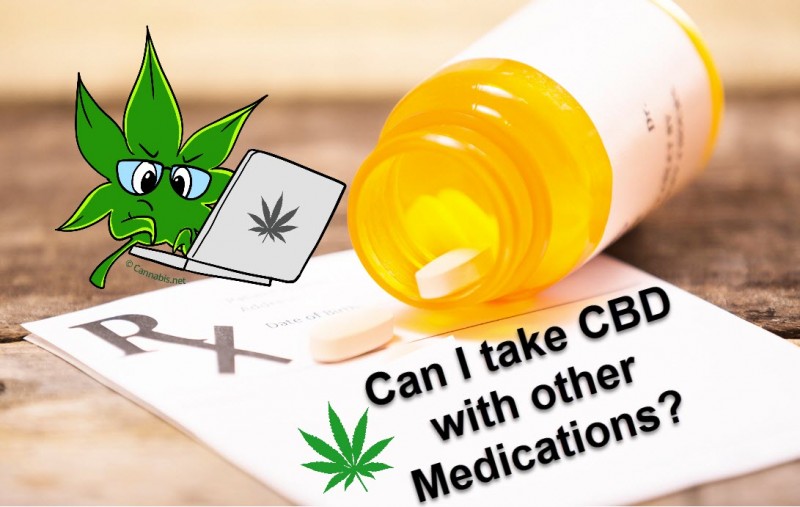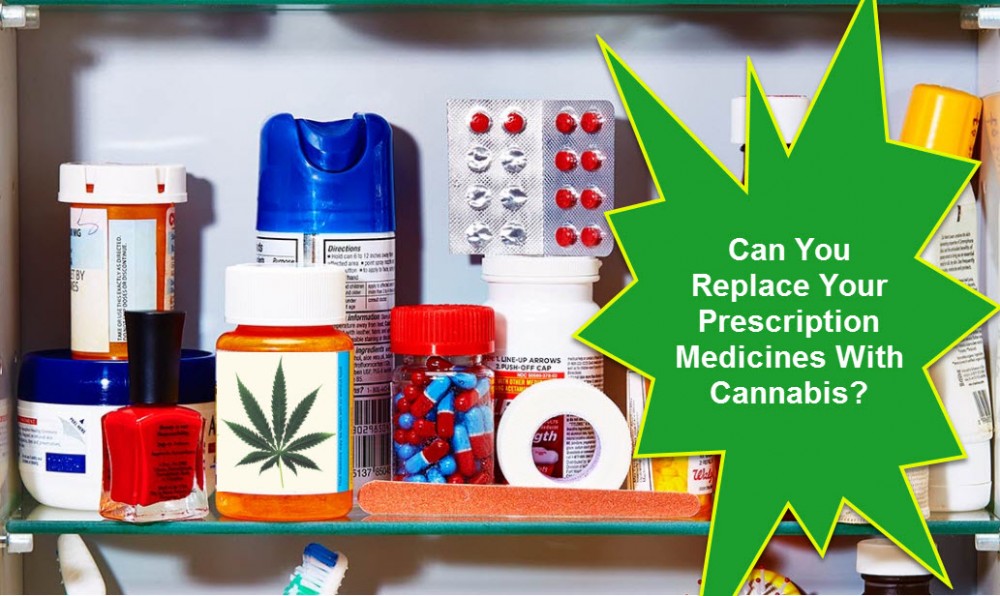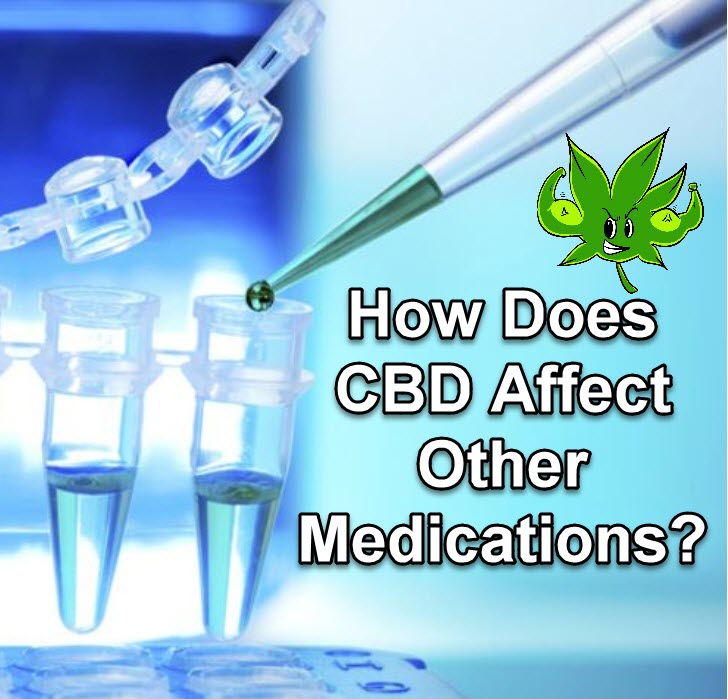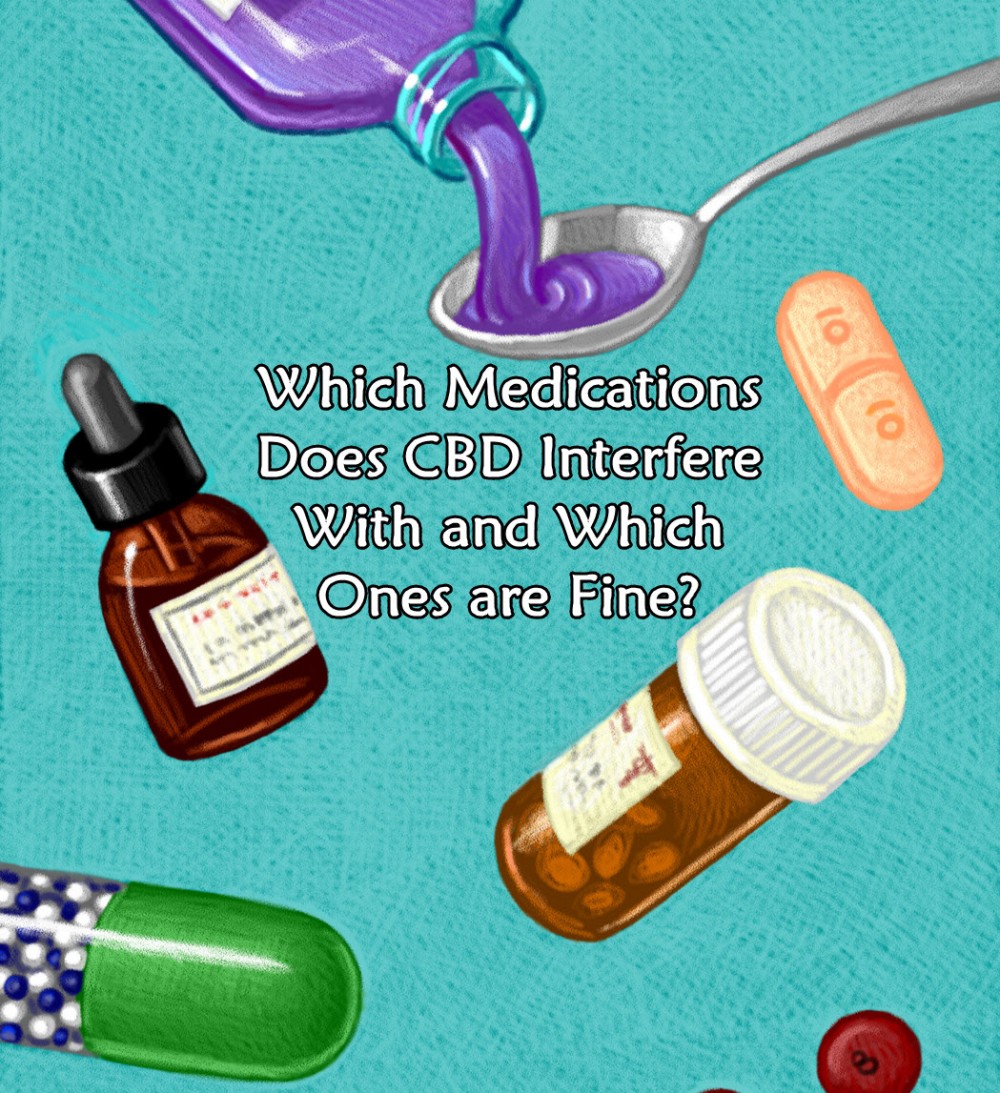Can I Take CBD With Other Medications?
Can You Take CBD with other Medications and Prescriptions? from CannabisNet on Vimeo.
Depending on where folks get their information from and what sorts of media outlets they follow, perception regarding the validity of medical cannabis use - and specifically the use of CBD - can vary wildly. I've had friends swear up and down citing "scientific evidence" that CBD oil can out-and-out cure cancer, while others have argued with equal aplomb that it's no more effective than any other herbal "cure-all" out there.
In all reality, the true therapeutic potential of CBD probably lies somewhere between these two extremes. There is just way too much clinical evidence and way too many scientific studies touting its positive effects for it to be passed off as just another bogus, interim health fad.
For those of you who are serious about trying the cannabis-based compound for its medicinal effects, however, you really need to know what sorts of interactions (if any) the drug may have with your current medications. And unfortunately, this is probably not something that your general practitioner will be able to help out too much with.
In this article, we have put together a comprehensive guideline on the general safety of CBD use, as well as what medications the non-psychoactive compound is known to interact with.
What exactly is CBD, anyway?
Before we get into the meat and bones of it all, however, let's clarify what exactly CBD is for those of you that are still in the dark.
Basically, CBD (short for cannabidiol) is a natural chemical component of the cannabis plant. It is classified as a "phytocannabinoid," and is in fact just one of over a hundred different varieties that have been identified in marijuana.
By and large, CBD and THC (another phytocannabinoid) appear to be the two main "culprits" when it comes to the medicinal effects of marijuana. The reason CBD has hit the global limelight in such blistering fashion recently is the fact that, unlike THC, it does not produce any sort of high. Simply put, it appears to offer all of the therapeutic potential of cannabis with none of the psychoactive effects.
As with any compound that interacts with chemical pathways in the human body, though, it will behave differently and produce different effects depending on what other types of compounds are present within that same pathway. In other words, the effects of CBD will vary depending on what other medications you are taking. And regardless of what some companies and "cannabis doctors" out there may say, it most certainly does interact with other medications. Here are the ones that you need to look out for.
What medications does CBD interact with?
To be clear, we are not doctors here and we emphasize the fact that none of the information in this article should be taken as medical advice. All of the information presented has been pulled from the most reliable sources possible, but due to the lack of quality research available, even these sources do not fully claim to understand the complex molecular pathways of CBD.
That being said, both the District of Columbia Department of Health (DCDOH) and the FDA have issued reliable reports in regard to CBD's interactions with other medications. The DCDOH, for example, has pointed out that CBD is a "potent inhibitor" of CYP3A4 and CYP2D6 enzymes, meaning it can affect serum levels of certain medications which are metabolized by these enzymes. In other words, blood concentration levels of the following medications may potentially fluctuate when taken together with CBD:
-
Macrolides (a class of antibiotics typically used for respiratory and skin infections, sexually-transmitted diseases, and mycobacterial infections)
-
Calcium Channel Blockers (cardiovascular medications that relax blood vessels)
-
Benzodiazepines (anti-anxiety medications such as Xanax, Valium, and Lorazepam)
-
Cyclosporine (an immunosuppressant commonly used to prevent organ rejection after transplant surgery; also frequently used in the treatment of psoriasis, rheumatoid arthritis, and other autoimmune conditions)
-
Sildenafil (viagra)
-
Antihistamines (allergy medications such as Allegra, Benadryl, and Claritin)
-
Haloperidol (antipsychotic medication used in the treatment of schizophrenia)
-
Antiretrovirals (medications that treat HIV)
-
Antidepressants (including some SSRIs, tricyclic antidepressants, and antipsychotics)
-
Beta-blockers (blood-pressure reducing medications)
-
Opioids (including codeine and oxycodone)
As you can see, this is quite a list. The CYP3A4 enzyme in particular is known for metabolizing about 25% of all drugs, though, which explains why CBD consumption can potentially have an effect on so many different medications.
Moreover, the serum levels of some statins have also been known to increase after CBD administration, with the DCDOH stating that atorvastatin and simvastatin, but NOT pravastatin or rosuvastatin, may be affected.
Additionally, CBD has also been known to increase the levels of warfarin (Coumadin, Jantoven), a common blood thinner, as well as clobazam (Frisium, Urbanol), which is a pediatric epilepsy medication.
What does the FDA have to say about the use of CBD with other drugs?
In light of the recent FDA-approval of Epidiolex, a prescription CBD drug for child epilepsy, the federal government has also issued documentation regarding the potential effects of cannabidiol on other medications, stating that "dose adjustments" may be needed when taken along with drugs that either inhibit or induce the following enzymes:
-
CYP3A4, CYP2C19, UGT1A9, UGT2B7, CYP1A2, CYP2B6, CYP2C8, CYP2C9
We realize this information is likely of no use to you, which is why it's recommended you speak with a doctor before administering any dose of CBD along with other medications. Even if they are not familiar with the specific properties of CBD, a doctor will at least be able to guide you on whether or not you should be taking it along with your current meds.
The current FDA report (which is actually the official prescription information for Epidiolex) does, however, point out that concomitant (simultaneous) use of cannabidiol with depressants and alcohol may "increase the risk of sedation and somnolence (drowsiness)," as well as increase the incidence of liver enzyme elevations when taken along with valproate, which is a drug commonly prescribed for intractable epilepsy, bipolar disorder, and migraine headaches.
All in all, if you are currently taking any of the above medications and are wondering whether or not it is safe to take CBD at the same time, make sure you speak with your physician first before making any changes to your current routine.
Cytochrome P450
Many publications have also highlighted CBD's ability to inhibit the activity of cytochrome P450 (CYP) enzymes, which are a class of compounds that metabolize most major prescription and over-the-counter drugs. Basically, it is understood that when taken together, the effects of CBD and CYP effectively negate each other, limiting each one's ability to carry out their respective roles in the body.
What does this mean in practical terms? Well, it basically means that you should give serious consideration to speaking with a healthcare provider before taking CBD along with other medications, as there is a good chance that the cannabis-based compound will affect the activity and/or the blood concentration levels of the drugs that you're currently taking.
That being said, there have been no known instances of death or hospitalization due to negative interactions between CBD and other medications. In fact, Adrian Devitt-Lee, a senior research associate with CannaCraft, has pointed out in an article for ProjectCBD that as long as the dosage of CBD is low enough, it will have "no noticeable effect on CYP activity."
But what exactly defines a "low enough dose?" Well, this is admittedly a gray area, as considerable blockage of CYP activity has been noted with CBD doses as low as 25 mg, while no blockage has been observed at doses of 40 mg and greater. Again, your best bet (really your only bet) is to speak with a physician about whether or not it is safe to take CBD while using other medications.
CBD and cancer treatment
Another consideration that should be taken in terms of using CBD with other medical treatments is the role of CYP activity in cancer treatment - specifically its role in oxidizing chemotherapy agents.
Since CYP activity is crucial to the metabolic breakdown of chemotherapy-induced toxins, it has been suggested that frequent high doses of cannabidiol may result in increased levels of toxic agents in the blood, which of course is a very serious matter that could potentially end with catastrophic consequences.
However, there have been no known instances of such consequences among cancer patients who medicate with CBD, and this is considering the fact that CBD (as well as other cannabis-based treatments) are a commonly-used therapy for chemotherapy-induced pain, nausea, immunosuppression, and other symptoms.
It could be that the neuroprotective effects of CBD negate the increased blood toxicity levels, or that the synergistic effects of the accompanying terpenes and phytocannabinoids work to limit the blockage of CYP activity on toxic chemotherapy agents. Whatever the case, it appears that using CBD while undergoing radiation or chemotherapy treatment does not pose any major risks. Regardless, it is still thoroughly advisable to speak with your physician before doing so, as they will be able to monitor blood levels and keep an eye on any accumulations of potentially toxic agents.
Summary: Can you take CBD with other medications?
As we've mentioned several times now, if you plan on taking CBD from any of the popular brands such as Green Roads CBD, PureKana or Charlotte’s Web, along with other medications, it's highly advisable that you speak with a physician before doing so. Given the fact that CBD blocks enzyme activity responsible for the metabolic breakdown of many prescription and over-the-counter drugs, frequent use of the cannabis-based therapy may result in increased or decreased drug concentration levels, which can of course pose an array of adverse effects.
All in all, much more research needs to be carried out regarding the use of CBD with other medications. Numerous studies have pointed out the potential therapeutic benefits of CBD, but until doctors and researchers fully understand the compound's molecular activity and physiological pathways, extra precaution should be taken when administering it along with any other conventional or alternative medicines.
Lastly, it's worth pointing out that, in terms of severe pain relief, Dr. Peter Grinspoon of Harvard Medical School has said that the simultaneous use of CBD with prescription painkillers can typically result in a dosing reduction, which of course is wonderful news considering the current opioid epidemic and the barrage of adverse side effects that opioid-based painkillers can present.
Can You Take CBD with other Medications and Prescriptions? from CannabisNet on Vimeo.
OTHER STORIES YOU MAY ENJOY...
CANNABIS TO REPLACE YOUR PRESCRIPTION DRUGS, READ HERE.
OR..
HOW DOES CBD INTERACT WITH OTHER MEDS? CLICK HERE.









